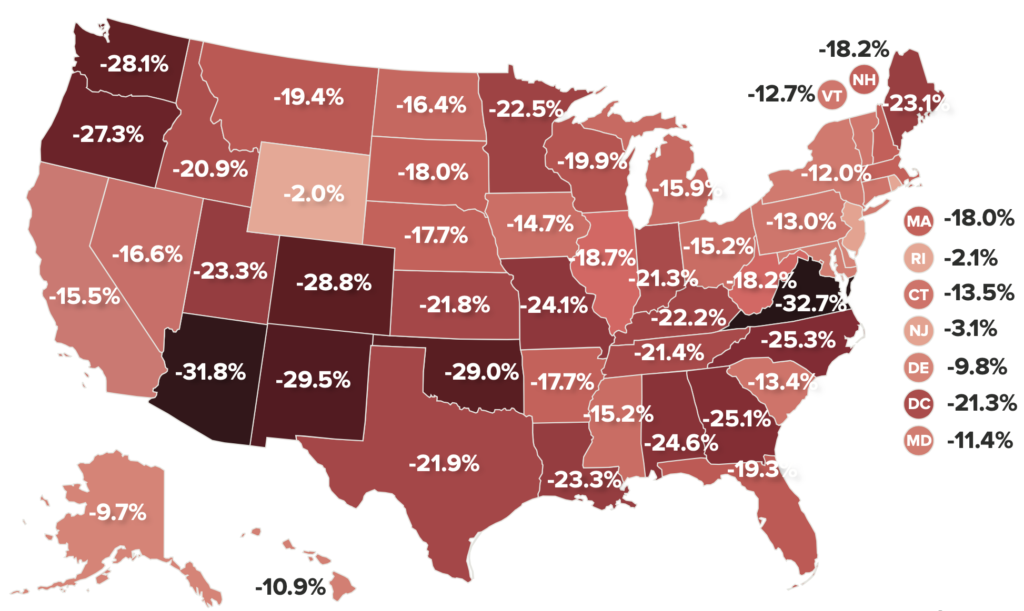Economic Policy Institute is out with a survey of teacher compensation relative to other, similarly educated professionals. The news continues to be bad for teachers nationally. Teachers earn roughly 20% less than comparably educated professionals on average. In Tennessee, that number is 21.4%.

See Allegretto and Mishel 2019, especially Appendix A, for more details.
Source: Authors’ analysis of pooled 2014–2019 Current Population Survey Outgoing Rotation Group data accessed via EPI Current Population Survey Extracts, Version 1.0.2 (EPI 2020).
That’s not good news. Especially in light of a worsening teacher shortage crisis.
It’s especially bad news in light of TISA – Gov. Bill Lee’s new school funding formula. While Lee and his allies would have you believe otherwise, TISA does nothing to significantly invest in teachers. There’s no significant adjustment to teacher minimum salaries and nothing in TISA directly results in hiring more teachers. This is disappointing since a state review suggests districts hire a total of 7000+ more teachers than the state funds.
Here’s more on the TISA reality:
Here’s more from EPI on what the teacher wage gap means in states across the country:
The teacher wage penalty has grown substantially since the mid-1990s. The teacher wage penalty is how much less, in percentage terms, public school teachers are paid in weekly wages relative to other college-educated workers (after accounting for factors known to affect earnings such as education, experience, and state residence). The regression-adjusted teaching wage penalty was 6.0% in 1996. In 2019, the penalty was 19.2%, reflecting a 2.8 percentage-point improvement compared with a penalty of 22.0% a year earlier.
The wage premium that women teachers experienced in the 1960s and 1970s has been replaced by a significant wage penalty. As noted in our previous research, women teachers enjoyed a 14.7% wage premium in 1960, meaning they were paid 14.7% more than comparably educated and experienced women in other occupations. In 2019, women teachers were earning 13.2% less in weekly wages than their nonteaching counterparts were—a 27.9 percentage-point swing over the last six decades.
The benefits advantage of teachers has not been enough to offset the growing wage penalty. The teacher total compensation penalty was 10.2% in 2019 (composed of a 19.2% wage penalty offset by a 9.0% benefits advantage). The bottom line is that the teacher total compensation penalty grew by 7.5 percentage points from 1993 to 2019.
It’s interesting that this problem is not getting significantly better, even as districts across Tennessee and around the country are dealing with both a teacher exodus and a lack of candidates to replace them.
It’s also interesting that even with a relatively stable, secure benefits package, the teacher wage gap continues to expand over time. It should be noted that in Tennessee, teacher pensions were “reformed” in 2014 and teachers hired since then now have a significantly smaller retirement package.
It’s also worth noting here that Tennessee teachers have the lowest pension benefit of any of our neighboring states.
As the study by SREB notes, Tennessee teachers earn about $10,000 less per year in retirement than their neighbors in other Southern states.
TISA could have been a way to change all of that – to vastly improve teacher compensation and make Tennessee a national leader in both pay and support for teachers.
Instead, the one-time raise offered by the plan will amount to about a 2.5% increase this year. Teacher pay in Tennessee will continue to lag behind other states in our region. Teachers here will continue to earn 21% less than their comparably educated peers.
Year after year, policymakers look at a growing problem and then just look away. Even in a year with a massive budget surplus, Tennessee leaders have made a clear statement that investing in teachers is not a priority.
For more on education politics and policy in Tennessee, follow @TNEdReport
Your support – $5 or more – makes publishing education news possible.








